#like they kinda accomplished that in the first couple episodes meeting the other units
Text
no offense but like what is the point of welcome to nct universe
#like i get that the premise is like introducing the rookies to what ncts all abt#like they kinda accomplished that in the first couple episodes meeting the other units#and we already got to see the bts for their smtown performance#so like what else is there to show but some mediocre filler#like damn can they just debut already#vinnie talks
0 notes
Text
Summer 2019 First Impressions
Hoo boy, three in a row, I think that’s a new record. Let’s just get right into it then.

Araburu Kisetsu no Otome-dono yo. (Maidens of the Savage Season): A high school literature club that actually reads literature, that’s a twist. The one issue with this is that a lot of literature has sex, and not all the girls of the club are particularly comfortable with sex yet. Those readings then cause those girls to become hypersensitive to sex and innuendos in the world and it looks like the show will be dealing with how they all deal with this.

Arifureta Shokugyou de Sekai Saikyou (Arifureta: From Commonplace to the World’s Strongest): Watching the descent into madness of a character generally takes a while, but in this show the main character snapped minutes after the point in time the show starts at, excluding a few flashback ranging from 10 minutes to 10 days back. Part of this included him eating monsters in the dungeon he was trapped in, which luckily granted him a bunch of strength and abilities. There was a lot going on, but overall I am cautiously putting this in the “so dumb it’s funny” category.

Bem: After getting sent to the seedier half of a city due to not getting along with her superiors, the main character proceeds to keep annoying her superiors with her dedication to justice, just in a more corrupt place. While trying to do her job, a water monster that’d been killing people throughout the episode appears before her. In addition a man who had helped her previously also shows up, and it turns out he’s a monster too. This looks like it will be two forms of justice, neither fitting in with the world, working together to protect humanity.
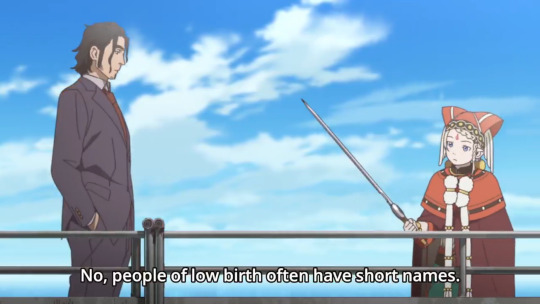
Cop Craft: If you’re expecting a buddy cop style show just based off the name, you’d be about right. It’s in a fantasy setting, with aliens and fairies, but the main character loses his partner while they attempt to arrest fairy traffickers, and his replacement is an alien knight who has come to the city to save the fairy. Since the main character wants revenge on whoever took out his partner, their goals would seem to align, but a young girl who doesn’t know the world too well isn’t his ideal for a new partner in the job.

Dr. Stone: What starts out as a normal day of school ends with all of humanity petrified for millennia. After all the achievements of man crumble to the sands of time, two friends break out of their petrification and start working to rebuild all that had been lost. A lot of scientific processes are explained as the characters do them in the new world so there’s a decent amount of educational tidbits in addition to the plot.

Dumbbell Nan Kilo Moteru? (How Heavy are Your Dumbbells? / How Many Kilograms are the Dumbbells that You Lift?): Edutainment anime have hit many topics, but this time we’re learning about working out, mainly focused on weightlifting. The main character joins a gym due to putting on a bit of weight and is joined by a muscle obsessed classmate and they are taught various lifting techniques by one of the trainers of the gym, who has the face of a prince and a body of unparalleled strength. It looks even better than I expected, with a lot of detail put into the workouts.

Dungeon ni Deai wo Motomeru no wa Machigatteiru Darou ka II (Is it Wrong to Try to Pick Up Girls in a Dungeon? / Is it Wrong That I Want to Meet You in a Dungeon 2?): Oh god the blue ribbon dress is gonna be all over the internet again.

Enen no Shouboutai (Fire Force): In a world where immolation has risen to the top cause of death, fire fighters play an even more important role in saving lives than usual. The only problem is that many of these deaths are caused by Spontaneous Human Combustion, which sends the afflicted into a berserk state while being on fire. That’s where the Fire Force comes into play, a specialized hybrid of fire fighters and the military, laying these afflicted souls to rest, often with unique fire abilities of their own. This first episode introduces the main character and the company he just joined with a trial by fire.

Ensemble Stars!: It’s an adaption of a male idol mobile game, so as expected the “main character” is supposed to be the player / viewer, which means she doesn’t get many opportunities to speak while all the other characters speak at her. The actual plot of the show looks to be an underdog uprising at a school with a fairly strict hierarchy system. As usual for mobile game adaptions, there’s a ton of characters, with a main unit of about 4 guys that the show will probably follow.

given: While trying to get to his favorite nap spot, the main character finds another guy with a broken guitar. After fixing it with the tools he had due to also being a guitarist, this other guy ends up following him around asking for guitar lessons, and while it never happened in the first episode, I’m willing to bet those lessons are coming soon. The background music is especially noticeable in this show, and it’s pretty good too, if not always fitting for the scene in my opinion.

Granbelm: When a high school girl gets sucked into another world for a monthly mecha fight for a yet explained title, she’s a little confused. She ends up teaming up with another girl in this world, since a lot of the other pilots tried to capture her since she got here. After an explanation and a quick mecha summoning scene, she’s ready to fight, and fight she does. The first episode eschewed a major exposition dump, instead showing off a decent amount of fighting, which looked pretty good overall, so I’m definitely checking into at least one more episode to figure out what’s going on.
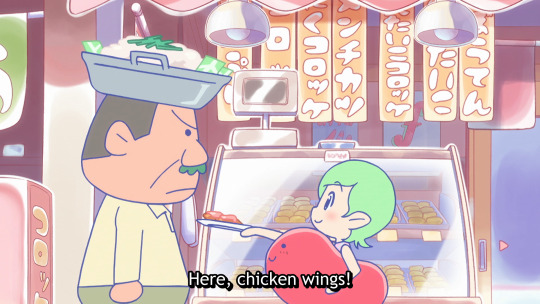
Hakata Mentai! Pirikarako-chan (Hakata Pollock Roe! Pirikarako): It’s a short for young kids, and it’s about food fairies, which is about all I got from the 3 minutes of the first episode.
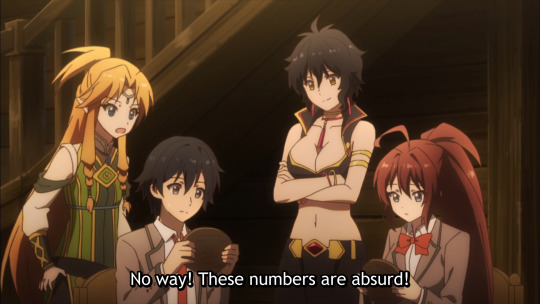
Isekai Cheat Majutsushi (Isekai Cheat Magician): The premise is pretty standard for the isekai genre but this time it’s two friends who are brought to another world together. This episode was just exposition and a quick look to the future, both explaining how overpowered the main characters’ magic abilities are (almost like they’re cheating, hahah). In addition it just looks pretty bad, the animation generally looks to be missing a few frames of animation and tries to not have multiple things moving at any given time.
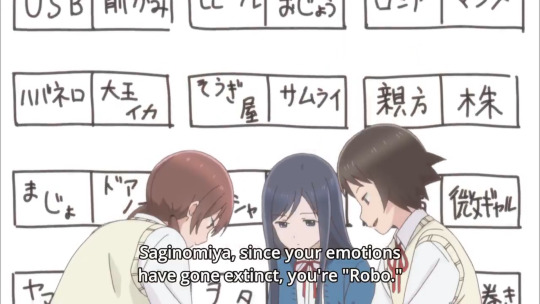
Joshikousei no Mudazukai (Wasteful Days of High School Girls): It’s just a class of high school kids, at an all girls school, trying to live their lives. Most of the characters seemed pretty unique, only a couple that seemed to rely heavily on tropes so far, and the comedy hit hard a couple times. A solid start, and I’ll be testing at least another episode to see how well it keeps up.
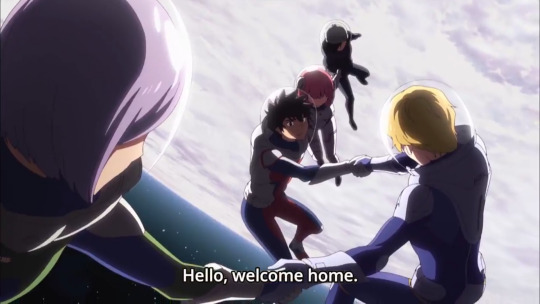
Kanata no Astra (Astra Lost in Space): What starts out as a sci-fi high school field trip / challenge turns into a full fledged survival disaster when the group gets warped from a deserted planet near civilization to just offworld of another planet months away from where they should be. Survival in space isn’t as common as I’d like it to be, and this is giving off some Apollo 13 vibes, which I love, and I trust Studio Lerche to make it look good, as it has through this first double length episode.

Karakai Jouzu no Takagi-san 2 (Skilled Teaser Takagi-san 2): I wasn’t really a fan of the master of teasing in the first season, so that carries through to this season.
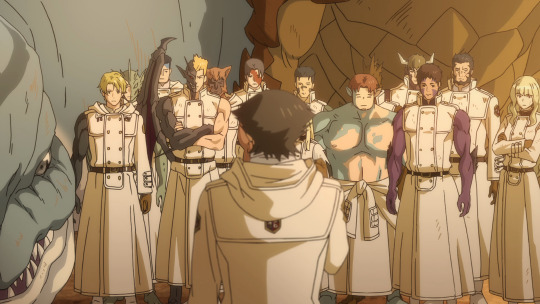
Katsute Kami Datta Kemono-tachi e (To the Abandoned Sacred Beasts): During a civil war, the losing side turns to human experimentation to create super soldiers, and is successful. These soldiers are turned into hybrids with supernatural strengths and abilities, and using these powers, force the civil war to an end. The downside of these powers unfortunately has been manifesting in the soldiers throughout the war, eroding the minds of the soldiers and causing them to lose control of their abilities. The anime and manga start off completely differently, with the former showing all of the above and the latter briefly describing it, which kinda changes the monster of the week format by introducing all the “monsters” as friends of one of the main characters before starting the main plot, as episode 2 looks like it will start where chapter 1 did.

Kawaiikereba Hentai demo Suki ni Natte Kuremasu ka? (Would You Love a Pervert as Long as She’s Cute?): First off, I have mixed feelings with the title, as it kind of spoils the main plot twist of the first episode. The main plot so far is that the main character has received an anonymous love letter from one of his clubmates, with a pair of panties attached, and is trying to figure out who sent it. The show already is hurtling towards a harem of girls with mid-level fetishes, with petplay already on the list. In general the lighting of a lot of the scenes also felt weird, a bit too bright a lot of the time, with some odd splotches of color.

Kochouki: Wakaki Nobunaga (Gorgeous Butterfly: Young Nobunaga): Nobunaga is a popular main character choice for anime, and not always for the historical setting. Though this show looks like it will be focusing on a younger Nobunaga, before many of his military accomplishments, starting during his childhood and getting to his 14th birthday, by the end of the episode. I want to say this is going to be historical fiction, but since they put a time skip right at the end of the episode, I can’t tell if this one was just for character introductions, or was also tone setting.
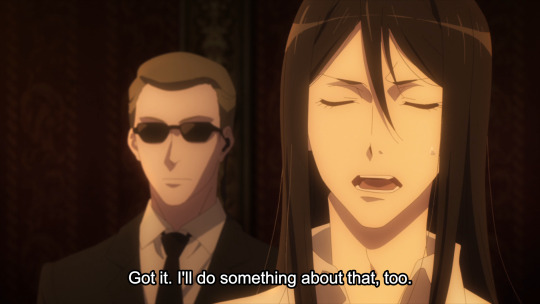
Lord El-Melloi II no Jikenbo: “Rail Zeppelin” Grace Note (Lord El-Melloi II’s Case Files: “Rail Zeppelin” Grace Note): Another side story of the Fate/ series that follows one of the characters from Fate/Zero after the events of that series. There’s an episode 0 for this that I feel embodies more of what the show will be about than the episode 1, which gives the viewer context of how the main character got from the end of his role in Zero to the beginning of this series. The magic system of the series is pretty interesting, and exploring it in a more mystery fashion than action is promising. I think this will be a lot like other Fate/ spin-offs, where you can watch it without prior knowledge of the series, but it helps to know when certain events are referenced.

Machikado Mazoku (Demon Girl on the Street Corner): This is the opposite of a magical girl show, where we follow a girl who has just gained the powers of a demons, who needs to sacrifice a magical girl to become stronger. The main issue is that she is overwhelmingly unfit to do so, and the local magical girl has significantly more experience doing her job. The show is overloaded with sound effects and onomatopoeias on screen which can get a bit confusing depending on how it’s subtitled.
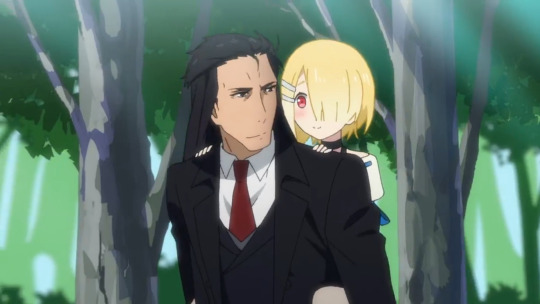
Maou-sama, Retry! (Demon Lord, Retry!): Pretty much the only creative thing I noticed while watching this was the protagonist’s facial structure, everything else feels like it could be traced to some other isekai show. Guy gets sent into game world that he made as his character, saves a girl from a demon, girl joins party, guy heads off to major city, episode ends. The OP and ED hint at modern technology involved with some shots of guns, but the bog standard plot so far and sub-par animation prevent me from spending any more time on this.

Naka no Hito Genome [Jikkyouchuu] (The Ones Within [Now Streaming]): A group of video game Let’s Players get kidnapped to an unknown location and are forced to participate in random events while being live streamed to somewhere. They’ve been told that they can’t leave until their game has gotten 100,000,000 views and have been indirectly threatened with death upon failure to do so, and as a possibility of the events. There’s some awkward visual and sound effects so far, but I’m intrigued enough by the premise to continue watching.

Odoru Mowai-kun (Dance, Mowai): A short about a Moai head that gains arms and starts dancing, which is difficult to find online.
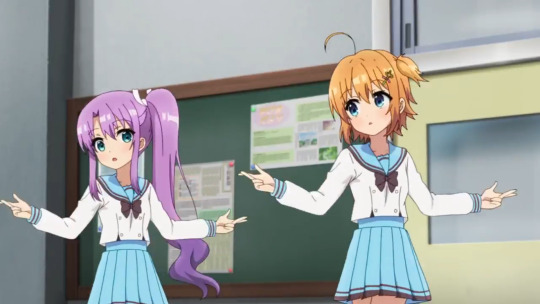
Re:Stage! Dream Days♪: The show plowed through a significant a significant tropes so far, with a transfer student living in the shadow of her sister saving a dying school club by joining, and all of this as one character’s reason and conflicts for joining an idol club. On the other hand, the rock band showcased and non-CGI dance routine tell me that the team behind it are willing to put in effort towards making the show good.

SD Gundam World: Sangoku Souketsuden (Chibi Gundam World: Three Kingdoms Origins): It’s related to another SD Gundam series, and will be out soon. I’m not sure it’s worth updating this entry when it comes out, being a sequel.
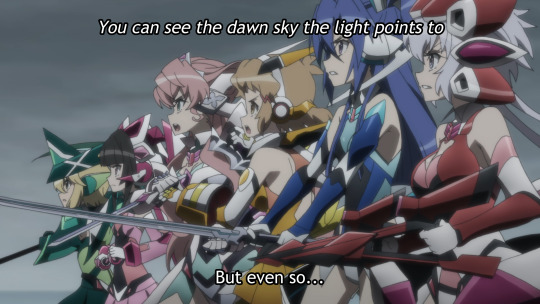
Senki Zesshou Symphogear XV: I actually want to watch Symphogear but there’s just so many anime always.

Sounan Desu Ka? (Is that So? / Are You Lost?): 4 high school girls, stuck together on an island with only the shirts on their backs and various fields of knowledge and expertise. Fortunately one of them grew up with a survival nut father, so their chances of not dying is higher than your average group. It got a little lewd at points, but overall I liked the practical approach taken so far for surviving together.

Star Mu 3: Season 3? Of a boy band anime? HA.
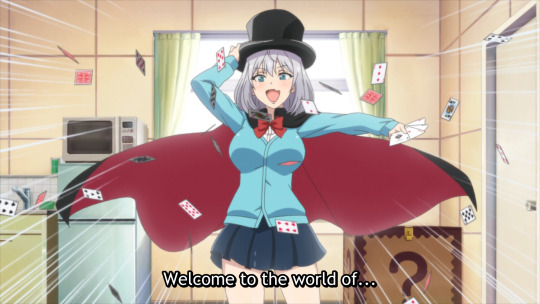
Tejina-senpai (Upperclassman Magician / Magical Sempai): Due to his school requiring students to join at least one club, the point of view character finds himself checking out the magic club. The only member there is practicing, but as soon as she notices that she’s got a visitor, she goes through a short routine, flubbing every trick spectacularly. The anime seemed to downplay an important fact a bit in the first episode, which is that the upperclassman is actually great at magic tricks, as long as the audience isn’t larger than 0.

Toaru Kagaku no Accelerator (A Certain Scientific Accelerator): I have read some of the A Certain series, I have watched some of it, I know the main character of this series. I don’t think that’s enough to be able to watch this and understand what’s going on.

Tsujou Kougeki ga Zentai Kougeki de Ni-kai Kougeki no Okaa-san Desu ka? (Do you Like Your Mom and Her Two-Hit Multi-Target Attacks?): The most inspired isekai of the season in my opinion, as it’s not the main character who’s overpowered, it’s his mom, who got brought into a video game world with him. There’s a decent amount of jokes about video games and the betas for them and going on an adventure with a parent is pretty rare. I’m just worried about how it’ll be handled, given that the OP and ED didn’t have any other guys besides the main character and that’s usually a red flag for harem business.

Try Knights: There’s still two more weeks until this starts, so this entry will be updated then.

Uchi no Ko no Tame Naraba, Ore wa Moshikashitara Maou mo Taoseru Kamo Shirenai (If it’s for My Daughter, I‘d Even Defeat a Demon Lord): While working on a quest in the forest, an adventurer happens upon a child all alone, and finds out that she’s a demon exile, thrown out with her dead father. Not wanting to leave a defenseless child to fend for herself in the forest, he brings her back to the tavern where he lives, and cares for her a bit, and they end up getting attached to each other. By the end of the episode, he decides to adopt her and raise her with the help of the tavern owners, leading the show to be a cute show about raising a child, probably.

Vinland Saga: The episode hooks you with a bit of action, and then transitions into daily viking life in Iceland. . It looks pretty slick overall, and from what I remember from the manga is that a lot of the future content will be leaning towards the action side of that.

Waresho! Warera! Shodobutsu AIgo Iinkai (I am! We are! Small Animal Protection Committee): Something about aliens traveling to Earth to save endangered animals. Unfortunately I can’t find any way to watch it, subbed or raw.

Yama Shibai 7 (Theater of Darkness 7): It’s still about Japanese ghost stories.
0 notes
Text
Michael Schrage on high-impact innovation: An interview by Bob Morris
Michael Schrage is a Research Fellow at the MIT Center for Digital Business and a Visiting Fellow at Imperial College's Department of Innovation and Entrepreneurship. He examines the various roles of models, prototypes, and simulations as collaborative media for innovation risk management. Hsecurity community on cyberconflict and cybersecurity issues. He has presented workshops on design experimentation and innovation risk for businesses, organizations, and executive education programs worldwide.
Along with running summer workshops on future technologies for the Pentagon's Office of Net Assessment, he has served on the technical advisory committee of MIT's Lincoln Laboratory. In collaboration with the Center for Strategic and International Studies (CSIS), Schrage helped launch a series of workshops sponsored by the Department of Defense on federal complex systems procurement. In 2007, he served as a judge for the Industrial Designers Society of America's global International Design Excellence Awards.
Michael authored the lead chapter on governance in complex systems acquisition in Organizing e has served as an advisor on innovation issues and investments to major firms, including Mars, Procter & Gamble, Google, Intel, BT, Siemens, NASDAQ, IBM, and Alcoa. In addition, Michael has advised segments of the national for a Complex World (CSIS 2009). He has been a contributor to such prestigious publications as the Harvard Business Review, Sloan Management Review, the Financial Times, The Wall Street Journal, strategy+business, IEEE Software, and the Design Management Journal. In his best-selling book, Serious Play: How the World's Best Companies Simulate to Innovate, published by Harvard Business School Press (2000), Schrage explores the culture, economics, and future of prototyping. His next book, Getting Beyond Ideas was published by Wiley (2010). His latest book, The Innovator's Hypothesis: How Cheap Experiments Are Worth More than Good Ideas, was published by MIT Press (2014)
Here is an excerpt from my interview of Michael.
* * *
Before discussing The Innovator’s Hypothesis, a few general questions. First, who has had the greatest influence on your personal growth? How so?
Certainly, my parents. But since adolescence and university, I would unhesitatingly say my friends and, of course, my wife. My friends and I take friendship seriously and we don’t indulge each other’s weaknesses even as we respect that no one is or should be without flaws. I like and admire my friends – and my wife – and they all give me superb perspective on what it means to try to be a good person. There’s a wonderful conversation to be had about "satisficing" and "optimizing" in this context but this isn’t the place.
The greatest impact on your professional development? How so?
These are more awkward than difficult questions because – of course – that’s not the "unit of analysis" I would use. Certainly, my time as a Washington Post journalist/columnist had an enormous impact on me. I was in my early 20s and dealing with extraordinarily powerful, extraordinarily influential, extraordinarily smart and extraordinarily competitive people in a challenging environment. But the same could be said about my fellowship at MIT’s Media Lab back when Nicholas Negroponte was running it.
I’ve always – always! – made a serious effort to learn from my professional interactions. Best case, I learned from the very best about what made them "effective" and what make them tick. At worst, I gained greater insight into myself and my limitations. I became much more sensitive to the reality that great intelligence, great influence and great competence did not necessarily correlate with good character – and vice versa.
Years ago, was there a turning point (if not an epiphany) that set you on the career course you continue to follow? Please explain.
Yes. I was collaborating with my best friend to design and build new software back in the 1980s. I slept on his couch and we worked together for a fortnight but nothing was coming out of us but frustration and bad arguments. Here we were – two really smart guys who liked and trusted each other and were committed to doing something great – but we were getting nowhere. This made no sense to us and we were both getting depressed.
Rob finally said, "Look, I know a guy – he’s a bit of a nut – but he’s come up with an interesting technology and approach to getting people to work together. We should see him." I skeptically responded, "What is he? A therapist? We’re going into couples therapy now…?"
But Rob said it wasn’t like that and so we went off to Bernie’s. Long story short: Bernie had hooked up a Mac to a Limelight projector and simply facilitated a design discussion between Rob and myself. As we talked, our conversation was made visible on a large screen. We began talking to each other through the screen; that is, the focus of or attention and communication was the shared space of our screen-based conversation. We began to move the words and phrases and then pictures and graphs. To use Bernie’s phrase, "We could see ourselves being heard…." This meeting directly led to our design document and a real breakthrough in mutual understanding and awareness. I "got" it.
This simple computer-augmented conversation had a huge impact. It was, forgive me, transformative and led directly to my first book about collaboration. I am fascinated, struck, and compelled by how technology can amplify and augment who we are and what we can do not just for ourselves but with each other. This has been central to my academic research and advisory work. I had vaguely appreciated and understood that before the conversation with Bernie but that episode crystalized/galvanized and every other kind of ‘ized’ that into an epiphany.
To what extent has your formal education been invaluable to what you have accomplished in life thus far?
Invaluable is a tricky word. Honestly, only three or four formal classes (and teachers) were truly ‘invaluable’ in my conceptual and/or intellectual development. My classes with Doanld Michie on AI; a couple of ‘history of economic thought’ seminars and workshops. A matrix algebra class.
There are only a handful of formal educational experiences I can or would point to as being integral to my professional development and effectiveness. That said, being in those environments – having opportunities for informal exchanges, projects, mentorship, apprenticeship, etc. – was imperative to success. Bluntly, most formal learning mechanisms didn’t fit with my personality, curiosity and aspirations. Fortunately – or unfortunately – I was clever enough to always do "well." But doing "well" and learning lots aren’t the same thing. I was genuinely interested not just in learning but in understanding the fundamentals and most of the subjects, courses and teachers I had in formal environments simply were unwilling or unable to provide that.
What do you know now about the business world that you wish you knew when you went to work full-time for the first time? Why?
I wish I was – or had grown up to be – more of a "people person." I never really cared that much about being liked or disliked. Don’t get me wrong. I like and enjoy people but – except for my friends and certain colleagues – I pretty much never cared if someone liked me or not. People can tell if you don’t care and this can be off-putting to many, many people.
In fairness to me, I kinda "knew" this before entering the business world but thought my energy, drive, intelligence and ability to collaborate with anyone would render the need for ‘likability’ irrelevant. Lord, was I wrong.
Of all the films that you have seen, which – in your opinion – best dramatizes important business principles? Please explain.
This is a funny question for several reasons. First, the films I truly enjoy literally have nothing to do with business and/or business principles or ‘learning.’ They’re simply great and wonderful films like Kind Hearts and Coronets and The Lady Eve.
But I was thinking as I was preparing some exec ed classes, what films I could draw on to make certain points clearer or more emotionally compelling. I confess the first one that immediately leapt to mind is that wonderful scene in Walk The Line when the record producer tells the Joaquin Phoenix/Johnny Cash character that the audition was perfectly adequate but absolutely nothing special. He asks him to sing something that really, really, really matters to him….the one thing that would define him. Then, of course, Cash and his combo step up to deliver it. I thought and still think that scene is wonderful because it beautifully captures the recognition that you need people to listen to you perform and then frame your creative challenges in actionable ways. You have to give people the chance to do the right thing. You have to be willing to listen to people try to be their best.
So to come back to your original question: I think there are many good films with several great moments. But what you ask is not how I experience the movies.
From which non-business book have you learned the most valuable lessons about business? Please explain.
That question is brutally unfair: I read and have read a lot. Again, I don’t read books with the intention of applying them to business practice. But I would say that the non-fiction genre that has had the greatest impact on my business thinking and behavior has been in the history of economic thought and psychology. That is, how theories of the mind and creativity co-evolve with the history and perception of value.
In terms of fiction, as rich and compelling as I’ve found "the classics," the honest truth is that science fiction – the willingness and ability to conjure up alternate planets, life forms, cosmos, physics, etc – has proven remarkably helpful to stimulating my own business/research imagination.
Here are several of my favorite quotations to which I ask you to respond. First, from Lao-tse’s Tao Te Ching:
"Learn from the people
Plan with the people
Begin with what they have
Build on what they know
Of the best leaders
When the task is accomplished
The people will remark
We have done it ourselves."
Yes. But what do we want empowerment to feel like? How do "the people" then "self-organize" to take the initiative in ways that traditional leaders can’t?
From Howard Aiken: "Don't worry about people stealing your ideas. If your ideas are any good, you'll have to ram them down people's throats."
Not in my world. In my area, there’s an openness and willingness to play with and explore ideas. Then again, Aiken was at Harvard; I’m at MIT.
From Richard Dawkins: "Yesterday's dangerous idea is today's orthodoxy and tomorrow's cliché."
Yes – but only when people decline to revisit the fundamentals.
From Isaac Asimov: “The most exciting phrase to hear in science, the one that heralds the most discoveries, is not "Eureka!" (I found it!) but 'That's odd....'”
I couldn’t agree more.
From Thomas Edison: “Vision without execution is hallucination.”
Yes…and there’s a lot of C-suites debating hallucinatory quality instead of designing due diligence into operations.
Finally, from Peter Drucker: "There is surely nothing quite so useless as doing with great efficiency what should not be done at all."
The false gods of optimization remain pervasive and persuasive. What we do – and appear to do well – gets a presumption of ‘worthiness’ that is frequently not deserved.
In one of Tom Davenport’s recent books, Judgment Calls, he and co-author Brooke Manville offer “an antidote for the Great Man theory of decision making and organizational performance”: organizational judgment. That is, “the collective capacity to make good calls and wise moves when the need for them exceeds the scope of any single leader's direct control." What do you think?
Well, I like "decision markets" and respect "wisdom of crowds" models of interaction and assessment. That said, I’ll refer back to the Lao Tse quote you cited earlier: I’m genuinely more interested in how great leaders – and great leadership teams – design for empowerment and collective insight. I want both.
Here’s a brief excerpt from Paul Schoemaker’s latest book, Brilliant Mistakes: "The key question companies need to address is not ‘Should we make mistakes?' but rather Which mistakes should we make in order to test our deeply held assumptions?'" Your response?
Yes…but isn’t this what we call "learning from feedback"?
Feedback indeed. Schoemaker's point suggests to me the importance of experimentation that serves strategic purposes. In your opinion, why do so many C-level executives seem to have such a difficult time delegating work to others?
Because they are control freaks (in denial) who all too often believe they’re the smartest people in their organizations or at least in any room they occupy.
The greatest leaders throughout history (with rare exception) were great storytellers. What do you make of that?
There’s an implicit issue here that demands unpacking. Are their stories great? Or are they great storytellers? I think you need both…but if I had the choice, I would go with the "leader" who has the great story to tell as opposed to being a great storyteller. Yes, motivation is important. But I am – in the first and final analysis – a substance guy. What is the substance – not just the style – of that great story? Is it the kind of story that people can understand, share, build upon, develop, turn into a movie or another form of narrative expression? I get scared when charisma can be confused and conflated with content.
My own opinion is that charisma resembles a pleasing, expensive fragrance. It smells good but don't drink it. Change agents, for example. Most change initiatives either fail or fall far short of original (perhaps unrealistic) expectations. More often than not, resistance is cultural in nature, the result of what James O’Toole so aptly characterizes as “the ideology of comfort and the tyranny of custom.”
Here’s my question: How best to avoid or overcome such resistance?
Make discomfort a norm. That’s what the special forces do: No Easy Day. People have to learn to live with discomfort. To me, the question is – how much? We don’t want discomfort that pushes people or their productivity and creativity past the point of diminishing returns.
In recent years, there has been criticism, sometimes severe criticism of M.B.A. programs, even those offered by the most prestigious business schools. In your opinion, in which area is there the greatest need for immediate improvement? Any suggestions?
Yes.
1. Insist that people work in the real world at least two years before applying for an MBA.
2. Require MBA students to do/perform original research, not just analyze case studies and algorithms.
3. Appoint the best qualified alumni to serve as adjuncts and advisors for MBA projects
4. Use Executive MBA courses and classes to inform and inspire MBA curricula
5. Insist that graduates take and pass a test or assessment or submit a portfolio five years later to ‘keep’ their MBA credential
Yes…how best to balance investment in human capital development of clients, customers and personnel with investments in "machine learning" platforms, processes and systems?
My advice: Read my books!
* * *
Here is a direct link to the complete interview of Michael.
He cordially invites you to check out the resources at these websites:
MIT Faculty page link
The Innovator's Hypothesis/MIT Press link
Amazon link
Amazon link to Who Do You Want Your Customers to Become?
YouTube videos link
Big Think videos link
from personivt2c http://employeeengagement.ning.com/xn/detail/1986438:BlogPost:194037
via http://www.rssmix.com/
0 notes